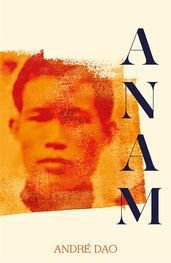Anam
André Dao
Synopsis
‘A profound meditation on forgiveness and forgetting . . . Dao’s extraordinary debut novel combines fiction and history to chronicle his Vietnamese grandparents’ traumatic life.’ — The Observer
Moving from 1930s Hanoi through a series of wars and displacements to Saigon, Paris, Melbourne and Cambridge, a deeply moving novel of memory and inheritance, colonialism and belonging, exile and home.
Born to a Vietnamese family based in Melbourne, the narrator is haunted by the story of his grandfather whose ten-year imprisonment by the Communist government in Vietnam’s notorious Chi Hoa prison looms large over his own place in the world and his choice to become a human rights lawyer. As he oscillates between identities of his Australian upbringing and his Vietnamese heritage, it is the death of his grandfather in a Parisian suburb and the birth of his daughter that crystallize the strands of thought that have shaped his life.
André Dao’s Anam blends fiction and essay, theory and everyday life to imagine that which has been repressed, left out, and forgotten by archives and by families. As the grandson sifts through letters, photographs, government documents and memories, he has his own family to think about: a partner and an infant daughter. Is there a way to remember the past that creates a future for them as well? Or does coming home always involve a certain amount of forgetting?
This impressive novel illuminates lives that rarely come to the attention of readers. Braiding fiction, essay, family stories and history, the result is a profoundly moving remembrance of things past as well as an invitation to look to the future. There is kindness and insight on every page.Michelle de Kretser, author of Questions of Travel
Andre Dao’s Anam . . . confirms his status as a young writer to watch . . . Blending fiction and essay, Anam is about a grandson trying to learn his family story and explores ideas of home, exile and identity.Sydney Morning Herald
Riveting, wise, transporting, Anam turns its back on the memory industrial complex and keeps the past unassimilable, both dangerous and fragile.Maria Tumarkin, author of Axiomatic
